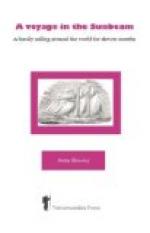We soon descended the heights again, and, passing the Cantonese Viceroy’s yamuns paid our promised visit to the French Consul. His residence is, if possible, more quaint and beautiful than that of the English representative. The trees are finer, especially one grand avenue leading from the outer gates to the private apartments. We were most kindly received, and shown a wonderful collection of embroideries and china. It was a delightful visit, but we could not remain so long as we wished, for we had to see the water clock. The tower in which it stands is approached by a flight of steps, and was built between the years A.D. 624 and 907; but it has been repaired, destroyed, and repaired again, several times, having suffered in the bombardment of the town by the allied fleets in 1857.
In the next street, Treasury Street (said to be the finest in Canton), you can buy burning-sticks measured to mark the time. They are extremely cheap, but perfectly accurate, and there seems little doubt that they have been used by the Chinese for thousands of years before the Christian era. Here, too, were the large spectacles so much worn; opium pipes, with all the paraphernalia for cleaning and smoking them; water pipes in pretty little shagreen cases, and many other curious articles in common use, of which we purchased specimens.
In the Feather Street are innumerable shops containing nothing but feathers of all kinds for mandarins, actors, and ordinary mortals; but the great ambition of every Chinaman is to have a feather from the Emperor. They are all called peacocks’ feathers, one-eyed, two-eyed, or three-eyed; but, in reality, many are pheasants’ feathers. Some of these are from six to eight feet in length, beautifully marked. I bought two pairs over seven feet long. They are rather rare, as each bird has only two long feathers, and these are in perfection for but one month in the year. In this part of the town stands a Chinese restaurant where only cats’ and dogs’ flesh is served.
We passed through innumerable streets, and at last reached the site of the old factories, now only occupied by a large and comfortable house. We were to have embarked in the Consul’s boat to visit the Temple of Honan across the river, but it was getting late, and every one felt tired; so we went back through more crowded streets to rest awhile, before dressing to go out to dinner at eight o’clock. The dinner was quite English in its style, and the table looked bright with tea roses, heliotrope, and mignonette. The tables had been charmingly decorated by the Chinese servants, and even the menu had been arranged by them. They seem to save their employer all trouble, even that of thinking, provided the services of really good ones can be secured. We have had one for only a few days, and he does everything for Tom and me. He appears to know exactly what we want to do or to wear, and to foresee all our requirements.




